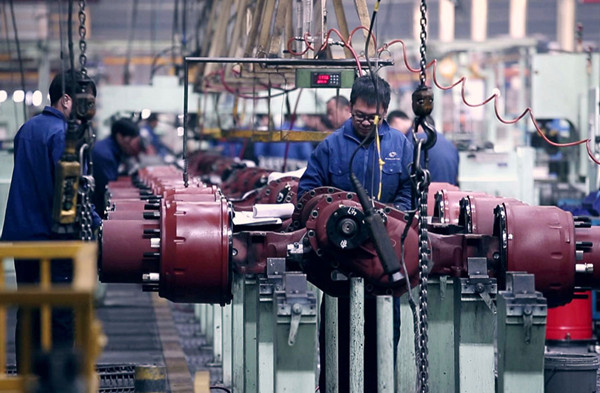In truck with the world


Beiben's workers assemble truck axles at a factory based in Baotou, North China's Inner Mongolia autonomous region. [Photo provided to China Daily]
Last year, China saw sales of 1.11 million heavy trucks, up 52 percent, and a record since 2010, according to the China Association of Automobile Manufacturers.
This year so far, overseas markets continue to hold promise for Chinese heavy truck producers, said a recent report from the Qianzhan Institute for Industrial Research.
As the Belt and Road Initiative advances, the number of infrastructure projects in the participating economies has increased. Chinese heavy trucks have been exported to local users and Chinese-funded engineering companies, according to the report.
Lured by the vast potential, major commercial vehicle manufacturers are racing to grab market share.
Sinotruk has been the largest Chinese exporter in the industry over the past decade. Between January and November 2017, Sinotruk exported 33,000 vehicles. During the same period, Sinotruk's heavy truck exports accounted for about 50 percent of China's total.
Asked about Beiben's advantages amid fierce competition, Jin said the group has been fueling technological innovation, while advancing the integration of products for military and civilian uses in recent years.
According to him, a type of Beiben's tractors with enhanced capabilities have achieved several breakthroughs, and sell well in markets like Singapore and Chile.
The tractors' performance could rival advanced models made by European and US companies, according to Jin.
In a few days' time, Beiben plans to deliver another type of tractors designed for complex conditions to Singapore clients. The vehicles meet Euro 6 emission limits, the highest emissions standard imposed by the European Union, with the aim of improving air quality.
Liu Zhiyuan, secretary general of the Beijing-based Transcontinental Research Institute, said Chinese firms seeking overseas expansion in economies involved in the Belt and Road Initiative need to unite to build a risk-prevention system.
An effective way for Chinese companies to prevent potential risks and lower operational costs is to seek enhanced cooperation with local partners, Liu said. "The collaboration can be conducive to fueling local economic development and improving the livelihood of local people."
MOST POPULAR
- 1 China to give visa-free treatment to another 9 countries
- 2 China fully opens manufacturing sector to foreign investors in landmark opening up move
- 3 China's import expo attracts record-breaking participating countries, exhibitors
- 4 China's door opening even wider to foreign visitors, businesses
- 5 China revises rules to ease foreign strategic investment in listed firms
Editors' Picks
 Video:
Peru sees new port open
Video:
Peru sees new port open
 Infographic:
China's public holidays for 2025
Infographic:
China's public holidays for 2025
 Infographic:
Basic facts of APEC
Infographic:
Basic facts of APEC
 Infographic:
Wrapping up the 7th CIIE: Data recap
Infographic:
Wrapping up the 7th CIIE: Data recap



